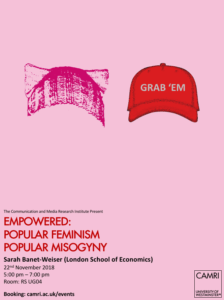Empowered: Popular Feminism and Popular Misogyny
309 Regent St
Marylebone, London W1B 2HT
UK

Sarah Banet-Weiser (London School of Economics) – Empowered: Popular Feminism and Popular Misogyny
In 2017, we are living in a moment in North America and Europe where feminism has become, somewhat incredibly, popular. It seems as if everywhere you turn, there is an expression of feminism—on a t-shirt, in a movie, in the lyrics of a pop song, in an inspirational Instagram post. There are many different feminisms that currently circulate in popular culture across all media platforms, some connecting with synergy, others struggling for priority and visibility. But feminism is not the only popular phenomenon we need to contend with in the early 21st century. For every popular feminist practice or expression, there is always an accompanying hostile rejoinder or challenge, regardless of the mediated space in which it occurred — whether that was social media, or the legal realm, or corporate culture.
In this talk, Professor Banet-Weiser will discuss the ways in which contemporary popular feminism re-imagines and re-directs what “empowerment” means for girls and women, and how it is restructuring feminist politics within neoliberal culture. For many, a broader acceptance of feminism as an identity, concept, and practice is exhilarating; yet, for those who find feminism to be a threat, this acceptance also stimulates fear, trepidation, aggression, and violence. This talk is about the deeply entwined relationship between the creation and expression of popular feminism and what Professor Banet-Weiser calls popular misogyny.
Biography
Sarah Banet-Weiser is Professor and Head of Department in Media and Communications at the London School of Economics and Political Science. She is the author of four books, The Most Beautiful Girl in the World: Beauty Pageants and National Identity (1999); Kids Rule! Nickelodeon and Consumer Citizenship (2007); Authentic™: Brand Culture and the Politics of Ambivalence (2012); and Empowered: Popular Feminism and Popular Misogyny (2018). She is the co-editor of three volumes, Cable Visions: Television Beyond Broadcasting (2007); Commodity Activism: Cultural Resistance in Neoliberal Times (2012), and the forthcoming Racism Post-Race (2019). She is currently the co-editor of Communication, Culture & Critique.

